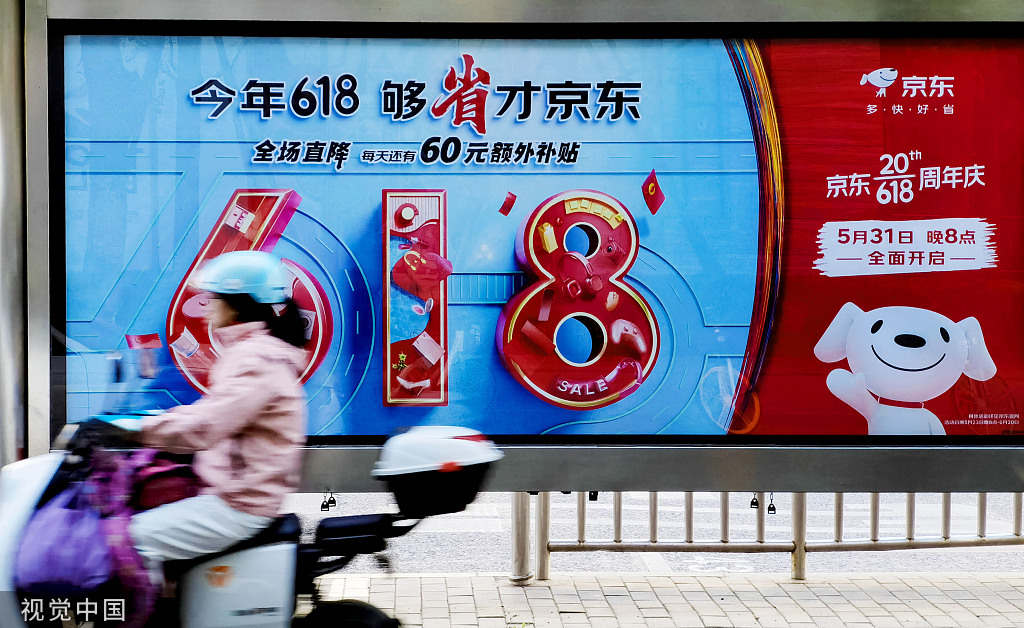Demand for quality foreign goods boosts cross-border e-commerce, consumption


Chinese consumers showed strong demand for imported goods during the recent June 18 shopping carnival, snapping up quality goods ranging from skin care products to watches and surfboards.
Data from e-commerce giant JD showed that transaction volume of 325 brands on JD Worldwide, its cross-border platform, surged more than 100 percent year-on-year in the first 10 minutes of the final promotion that kicked off at 8 pm on Saturday. Sales of products in JD's virtual national pavilions, covering overseas brands from more than 90 countries, skyrocketed 368 percent year-on-year during the brief period.
Imported sunscreen sales jumped 360 percent, luxury watches 170 percent and infant formula milk 200 percent on a yearly basis, JD said.
According to Tmall Global, the cross-border e-commerce site of Alibaba Group, the turnover of 419 new foreign brands doubled in the first four hours of its promotional campaign. More than 40,000 overseas brands participated in this year's June 18 shopping promotion.
Foreign brands of skin care products, surfboards, cycling equipment, wine sets and healthcare goods witnessed strong growth during the shopping extravaganza, which now spans about three weeks.
"Chinese consumers have demonstrated increasing demand for diversified, personalized and niche overseas products that represent new lifestyles, and are paying more attention to the value of the products they buy," said Zhang Zhou-ping, a senior analyst on business-to-business and cross-border activities at the Internet Economy Institute, a domestic consultancy.
Zhang said that cross-border e-commerce has played a significant role in enriching product supply, bolstering the development of new business models and promoting the recovery of consumption. He called for greater efforts to further optimize the list of imported retail goods for cross-border online purchases.
China's imports of consumer goods reached 1.93 trillion yuan ($269.6 billion) in 2022, accounting for 11 percent of total imports and more than double the amount in 2012, according to the Ministry of Commerce.
Meanwhile, a report from JD's Consumption and Industry Development Research Institute said that sales of imported products on JD's online marketplaces increased 50 percent between January and May compared with the same period in 2020, with the categories of imported products soaring 114 percent.
Personal care, cosmetics and skin care products, food and beverages, and maternity and infant products are the categories of imported products most favored by Chinese consumers.
People between the ages of 26 and 35 are the main consumers of imported products, accounting for 45 percent of buyers. Consumers in the 46 to 55 age group have contributed to the fastest growth in purchases of imported products.
While residents living in first-tier cities remain the primary purchasers of imported products, consumers in lower-tier markets have shown a growing interest in buying such commodities, according to the report.
Pan Helin, co-director of the Di-gital Economy and Financial Innovation Research Center at Zhejiang University's International Business School, said that lower-tier markets are a significant engine for driving the continued growth of new consumers and boosting purchases of imported goods.
Fully tapping into the consumption potential and upgrading channels and services in lower-tier cities and rural areas are key measures needed to fuel the recovery of consumption in China, Pan added.
"With the expansion of domestic demand and advances in emerging retail technologies, China has introduced preferential policies, such as lowering import taxes and expanding the range of goods allowed to be imported," said Zhang Tianbing, head of Deloitte Asia-Pacific consumer products and retail industry.
The boom in celebrity livestreaming has helped spur cross-border e-commerce purchases by domestic consumers, Zhang said. "Overseas brands are moving to cross-border (e-commerce) platforms as they expand their distribution channels in light of COVID-19 disruptions to offline retail," he said.




































